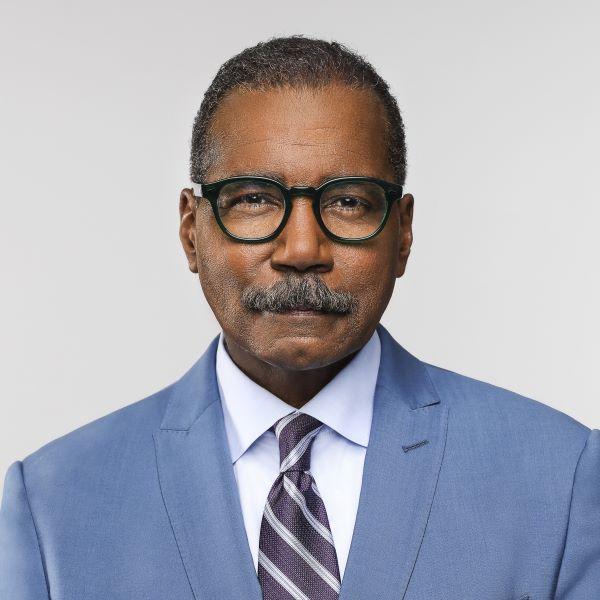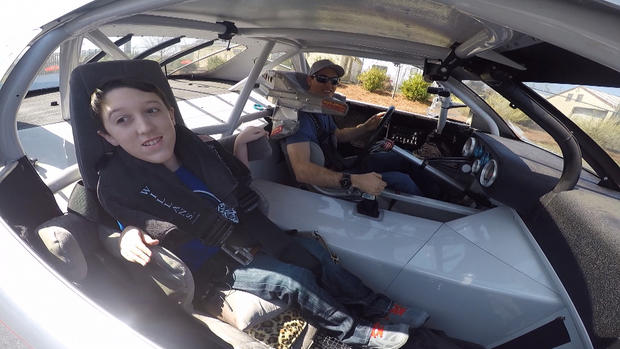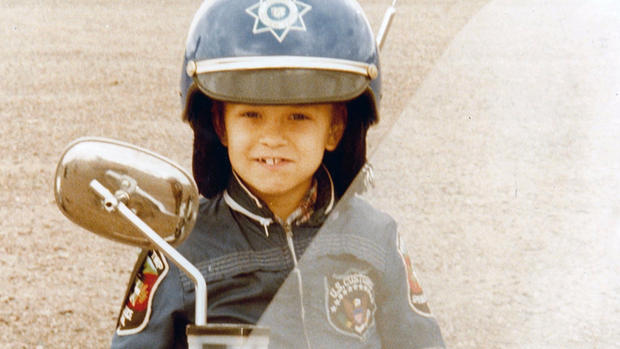How do Make-A-Wish wishes come true?
The following is a script from "Make-A-Wish" which aired on Oct. 18, 2015 and was rebroadcast on March 27, 2016. Bill Whitaker is the correspondent.Robert G. Anderson, Magalie Laguerre-Wilkinson and Aaron Weisz, producers.
On this Easter night, we celebrate people who are making a difference: hometown volunteers helping sick children's dreams come true; health workers bringing care to forgotten pockets of poverty, billionaires sharing their wealth. We begin with Make-A-Wish.
If you could be anything, go anywhere, or meet anyone, what would you wish for? The Make-A-Wish Foundation has been asking seriously ill children that question for 35 years. Make-A-Wish became famous by making dying children's final wishes come true. A child doesn't have to be terminally ill any more to get a wish.
Last year, the organization granted almost 15,000 wishes. They cover a broad range: some children get to meet famous athletes; one had much of San Francisco pretend he was Batman for a day. Another chose to jump from an airplane. We wanted to find out what leads to these wondrous moments.
Make-A-Wish is a growing organization that spent more than 200 million donated dollars on wishes in 2014. It's headquartered in Phoenix, has more than 60 local chapters across the country, and almost 40 more around the world. To see how wishes become reality, we spent time with some of its most dedicated volunteers in one of its most active chapters in the northeast corner of Arkansas. As we reported back in October, we discovered a place where -- despite persistent poverty -- we found inspiring generosity.
They begin at dawn. One day a year, hundreds of volunteers fan out across northeast Arkansas to raise money -- at street corners, in schools...their goal:
To get enough money on this one day to grant every wish for the area's sickest children. Volunteers Christie Matthews and Danna Johnson have run this fundraiser every year since 1999.
Christie Matthews: I mean, it literally just exploded. Every year we would add another town.
Bill Whitaker: This is small town America.
Christie Matthews: They're very small towns; 600, 700 people-- a handful of change at a time.
As this day's donation deadline approaches, groups of volunteers race to the local radio station to announce their town's total -- down to the penny.
[Give me a number. $8,468.62!]
[ $25301!]
[$12,054.55!]
Trey: Golly! The big finish is just moments away, standby.
The total tally from northeast Arkansas is the big story on the 7 o'clock news.
[TV announcement: What do we have here? 323,000!]
That's 323,000 -- enough to grant more than 30 wishes -- donated from places with little to spare.
In Harrisburg, 40 percent live in poverty, but this town of 2,000 still contributed $25,000.
Bill Whitaker: The wishes were going just to children who were dying. And that's no longer the case?
Christie Matthews: We talk about it not being a last wish, but we create lasting wishes and memories that these families can take on forever.
[Christie Matthews: Hi Kaden!]
Kaden Erickson is fighting a deadly type of leukemia. At his interview as a potential recipient, he thought his wish was a long shot.
[Kaden Erickson, home visit: My number-one wish choice is to go to Australia.]
Folks here make granting the wish a big surprise. Months after his interview, Kaden thought he was getting this plaque just for being a Make-A-Wish volunteer.
[Kaden Erickson: Make-A-Wish October 11, 2014. Kaden Erickson your wish has... your wish has been granted!]
[Kendra Street: Hey Kaden, you're going to Australia!]
His mother Jeanne...
Jeanne Erickson: He was just shaking the plaque. And his little legs were just doing a little happy dance in the chair. And it was-- it was something pretty special.
Bill Whitaker: You must have been surprised?
Kaden Erickson: I was the most surprised I've ever been in my life.
Kendra Street: I'm so excited for you. You know it?
Kendra Street choreographed Kaden's surprise. When not playing fairy godmother, she's teaching at Marmaduke Elementary School. Everyone at the school chipped in to pay for Kaden's wish, many turned out to share the revelation.
[Kaden Erickson: I get to go to Australia! I get to go to Australia!]
Kendra Street: He was excited. He was grateful. And he knew what it meant for him and his family.
[Kaden Erickson: Thank you everybody.]
Kaden had endured two excruciating bone marrow transplants. When he, his parents, and four siblings hit the beach in Australia, they hoped he'd beaten the cancer. The highlight of his trip?
Kaden Erickson: Got to hold a koala.
Bill Whitaker: Did he like put his arms around you?
Kaden Erickson: He--he--it was like a hug. It was about as heavy as a baby. And it would put the claws here and the claws here and so it was like you were getting hugged by a koala. You kind of get attached to the koalas.
Bill Whitaker: Did it make you forget for a while that you were sick?
Kaden Erickson: Yes. It made me feel a little bit normal, more normal than I've been for a while.
Feeling normal didn't last long. Shortly after returning home, Kaden learned his cancer had returned--for the third time. As we settled in for our interview, his mom Jeanne adjusted the medication he needs. It's pumped into his body next to his heart.
Bill Whitaker: You're in quite a struggle with this disease.
Kaden Erickson: There are some bad things in my body that are kind of stubborn.
Bill Whitaker: I think you're kind of stubborn yourself.
Kaden Erickson: Thank you. I think.
Kaden is so stubborn, that after deliberating for a week, he decided to undergo a third, agonizing, bone-marrow transplant. The previous two were so difficult, his parents didn't want to force him to go through it again.
Bill Whitaker: How did you make that decision?
Kaden Erickson: Would I rather just die or would I have a chance of living? It was a tough decision to make.
Bill Whitaker: Because the therapy makes you feel bad?
Kaden Erickson: It can make me feel bad. It can hurt me. It could do more harm than help. So I'm just hoping this time it will get rid of it for good.
Kaden's wish-granter, Kendra Street, was devastated when she learned his cancer had come back.
Kendra Street: You have an attachment with your kids. And Kaden's one that I've really attached to. And I've gotten to keep in touch with him. And so seeing him have to go through that again. It's--it's just painful. He's just a really amazing kid.
[Let's give Kendra a round of applause.]
You see, Kendra had survived her own fight with cancer. Back when she was in high school she had her wish granted.
[Make-A-Wish is sending you to the Atlanta Braves.]
Getting to meet the Atlanta Braves was thrilling, she says, but...
Kendra Street: Not to underestimate what my wish was for me, but if I had to sacrifice having my wish to be able to give it to someone else, I would definitely be willing to give it to someone else.
Bill Whitaker: Being the granter of the wish is the better end of the deal.
Kendra Street: Absolutely. You get to give that joy. You get to pass it on to someone else.
The same chapter passed it on to Gavin Grubbs. He suffers from debilitating muscular dystrophy, and his wish was to meet race car champion Joey Logano.
The day we met them outside Charlotte, Joey took Gavin for a spin. They met six years ago and have become so close, they call or text each other every week.
[Joey Logano: Can you see anymore? (laughing)]
[Gavin Grubbs: I can't see. (laughing)]
Gavin was a groomsman at Joey's wedding. It all began back when Gavin was eight.
[Make-A-Wish is sending you to the Daytona 500!]
At a school assembly Gavin learned he'd get his wish to go to Daytona and meet his hero. Then it got better. Logano had flown to Arkansas to be part of Gavin's surprise.
Gavin may have a serious disease, but, as you'll see, he doesn't take himself too seriously.
Bill Whitaker: So Gavin, tell me, you are fighting a rare form of muscular dystrophy.
Gavin Grubbs: Yes, sir.
Bill Whitaker: How does it affect you?
Gavin Grubbs: Main thing is I don't have the strength of a normal kid my age. Obviously, I mean, I'm in a wheelchair, but it's not all sad because, I mean, you're-- when you got a disability, people give you-- people give you free stuff. People let you do cool things. I'm not saying, I take advantage of it, but yeah, I take advantage of it. And sometimes I feel a little bad for taking advantage of it, but you know it's worth it. Hanging out with this idiot. (laugh)
Gavin gives back too. He helps raise money for new wish kids every year.
Gavin Grubbs: It feels good to help other kids.
Joey Logano: That's, to me, is maturity beyond your years. You take advantage of the stuff that comes your way as you should. But you also you know, you give back--
Make-A-Wish began back in 1980. Seven-year-old Chris Greicius, dying from leukemia, told his parents he wanted to be a police officer. Arizona police made him an officer for a day. The power of his wish launched a movement.
Bill Whitaker: Are there wishes you can't grant?
Christie Matthews: The one wish that's the hardest to say, "I can't do" is, "Can you make me well?" That's a tough one.
Bill Whitaker: What does that do to you?
Danna Johnson: Makes you cry.
Christie Matthews: Breaks your heart.
[Kendra Street: Thank you so much. Thank you.]
Years before she became a volunteer, getting well had been Kendra Street's first wish.
Bill Whitaker: At the time she thought her cancer was fatal.
Christie Matthews: Yes.
Danna Johnson: She was one of those that her first wish was to, "Make me well. So, I wanna live long enough for my mom to see me graduate high school." She was a senior that year.
Christie Matthews: They remind you that the little things that we think as adults are so traumatic are so small. I mean when you think about what these kids are going through--they may not see their next birthday.
Kendra saw her next birthday and since then, 13 more. Her cancer remains in remission. At Marmaduke, where she teaches, the whole school takes part in Make-A-Wish.
Kendra Street: They just understand the power of a wish. It's just--once they saw the first wish granted here, our kids wanted to help give that to someone else. We're a tiny, tiny school that's raised, last year, we raised $15,000. That's incredible. It plays a huge part of who our kids grow up to be.
[Kaden Erickson in Australia: There's a crocodile in there!]
Bill Whitaker: I don't want to overstate this in any way. But did the trip to Australia bolster Kaden's will to live?
Jeanne Erickson: Having Australia with him, having those memories, talking about that, it kind of gives him fuel to fight.
Kaden Erickson: Sometimes when I'm sad, I can think of all the happy things I did in Australia, and how amazing it was.
Bill Whitaker: You're not going to let this cancer win.
Kaden Erickson: Thank you.
You saw how courageous Kaden was. But, unfortunately, this story has a very sad ending. The cancer was relentless. This past September, Kaden died.
To support more wishes like Gavin's and Kaden's, you can contribute to Make-A-Wish, or go to wish.org to learn how to become a volunteer.
Kaden's family also asked that viewers direct donations in Kaden's name to The Ronald McDonald House of Memphis and St. Jude Children's Research Hospital in Memphis to support other kids and families in their fight against life-threatening diseases.


